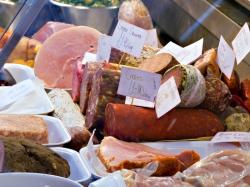New IDDBA Research Focuses On Innovation
August 30, 2011 | 3 min to read

Madison, WI — New, original research, titled “Innovation Trends, Attitudes, and Opportunities”, from the International Dairy-Deli-Bakery Association (IDDBA) is now available.
Innovative ideas from all aspects of business are of interest to supermarkets, food manufacturers, brokers, distributors, and others. IDDBA commissioned Datassential to study innovation in relation to new shopper technologies, social media, new food trends, nutrition, and a host of other areas.
Consumers were asked to provide feedback on more than 190 innovative concepts, products, and ideas. We used three primary data sources as the basis for the study:
(1) Over 3,000 consumer surveys
(2) Interviews with 20 experts from various categories (technology, food, etc.) with insights on potential innovations for the deli/bakery or store
(3) A review of notable food / flavor trends via Datassential's MenuTrends system—which tracks over one million items from more than 6,000 distinct North American restaurant concepts
A Few Key Insights:
Appearances matter – For today’s grocery shoppers, it’s less about the specific, individual items or technological perks and more about the total collective experience. While the components of innovation are often incremental, true innovation tends to be more transformative; it’s important to consider how those various pieces work together. For instance, a single new food item may not necessarily be regarded as a motivating innovation for consumers, but a well-developed platform for promoting new foods might. It’s also important to make sure that the basics are covered; for instance, many consumers noted cleanliness as an issue and a major turnoff. In that regard, simply doing a great job with the basics can in some ways be considered innovative as well.
Consumers are more aware of where their food comes from and they want more from their grocer than a simple seller-to-buyer relationship. They want to know the where, when, and how’s of the foods they buy. For instance, the burgeoning popularity of farmers markets is no accident—consumers gain a sense of community from interacting with the actual producers of goods they purchase. Consumers indicated repeatedly that they would welcome the chance to create ties with farmers and artisans via their local supermarkets and delis. They were also very positive on grocery retailer-sponsored community events. The time is ripe for grocery retailers to expand their roles in shoppers’ lives by presenting themselves as stewards of their communities and conduits between food sources and end consumers.
“Healthy” and “convenient” have both been major themes in food and foodservice for some time now. While this is still the case, both of these terms have grown and evolved – their definitions have broadened and they mean widely different things to different people. For instance, where "healthy" used to refer generally to low-fat, low-sugar, or low-sodium foods, survey results indicate that "healthy" means simply fresh or local to many consumers today. Likewise, “convenient” once meant just microwaveable or ready-to-eat. Now, for many, it can mean elimination of the wearying parts of making scratch meals or the ability to bypass customer lines by ordering from kiosks. New, innovative retail approaches to both of these persisting issues need to be developed in order to better suit changing consumer attitudes.
With the advent of sites like Groupon.com, LivingSocial.com, and Restaurant.com, not only is it no longer taboo to use coupons, it’s nearly in vogue. People are no longer ashamed to demand the best value for their dollars and they're glad for it, given that they are only now starting to get their post-recession bearings. Consumers consistently indicated high interest in a variety of coupon / discounting mechanisms – from traditional mailed coupons to more innovative couponing vehicles including smartphone applications, scannable bar codes, and social media. Delis with more progressive prepared food offerings – and which seek to compete for a larger share of the away-from-home meal dollar – can use couponing to draw in bargain-minded customers who might otherwise visit a restaurant.
About IDDBA: IDDBA is a nonprofit membership organization serving the dairy, deli, bakery, cheese, and supermarket foodservice industries. For more information on this research study, contact IDDBA at 608.310.5000 or go to our Web site, www.iddba.org.
About Datassential: Datassential is a full-service research provider for the food industry. The company specializes in consumer and B2B research, and is a leading industry source for food and flavor trends.
Information on IDDBA’s research, education, and other industry activities is also available at www.iddba.org, or by calling 608.310.5000. Now in its 48th year, IDDBA specializes in promoting the dairy, deli, cheese, and bakery industries. Member companies enjoy many benefits and services including the annual seminar and expo, leading-edge research, video and computer-based training programs, management tools, an annual trends report, and a member directory of key industry contacts.
Source: International Dairy•Deli•Bakery Association
